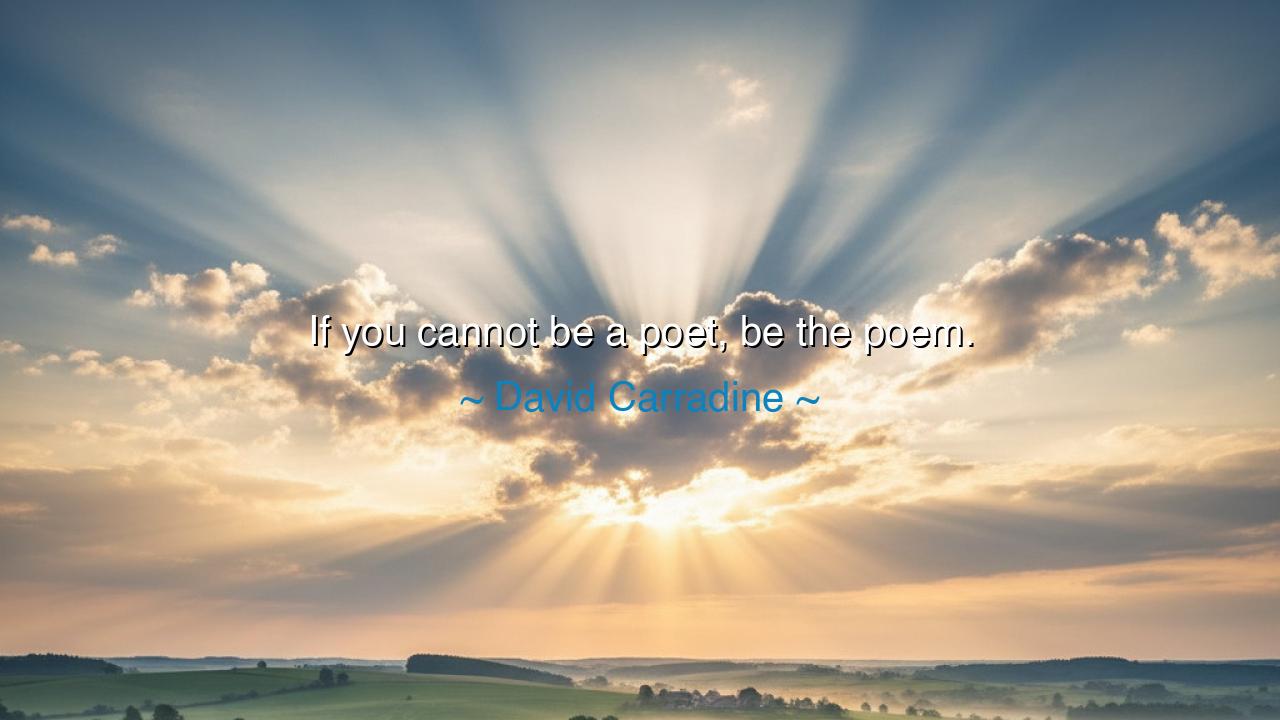
If you cannot be a poet, be the poem.






“If you cannot be a poet, be the poem.” Thus spoke David Carradine, and in this brief saying he revealed a truth as old as wisdom itself. Not all are destined to shape words into verse, to sing lines that echo through the ages. But every soul may yet become the poem itself—a living embodiment of beauty, of courage, of love, of meaning. For to “be the poem” is to live in such a way that your actions, your presence, your very being, speak with the eloquence of verse, even without ink or parchment.
The poet gives form to truth by writing it; the poem gives form to truth by living it. This is the higher call of Carradine’s words: to remind us that we need not all be creators of art, for life itself is the greatest canvas, and existence itself the finest scroll. Every choice, every word spoken, every act of kindness or defiance, is a line in the poem of one’s being. Thus, even the silent, even the unlettered, may yet speak volumes through the poetry of their life.
The ancients knew this. Socrates, though he wrote nothing, lived so fearlessly and truthfully that his death became one of the greatest poems in history. He was no poet with pen, yet his life, marked by questions, courage, and sacrifice, was a poem recited across generations. Likewise, Jesus of Nazareth wrote no verse, but his words and deeds became a living poem of mercy, strength, and sacrifice, inspiring countless songs and scriptures after him. Here we see the heart of the quote: the poet may fade, but the poem lived continues to resound.
Consider, too, the story of Anne Frank. She did not seek to be a great writer, yet her diary, born of an ordinary girl’s struggle against extraordinary darkness, became a living poem to resilience and hope. Her brief life itself was poetry, her courage shaping verses more powerful than any formal stanza. She was, as Carradine’s words suggest, not only one who wrote but one who became the poem—and because of that, her voice continues to shine against the silence of despair.
To “be the poem” is not merely to seek beauty, but to live authentically. It means to embody the values you wish sung about, to live a life so radiant that others see in you the reflection of something higher. The poet arranges words; the poem arranges deeds. The poet strives for rhythm and harmony; the poem in flesh strives for truth and meaning. In this way, every man and woman may become poetry, even without pen or voice.
The lesson for us is simple yet profound: do not despair if you cannot create as others create, if you cannot paint, or write, or sing. Your life itself is your art. Live with such compassion that your days rhyme with mercy. Live with such courage that your actions pulse with rhythm. Live with such honesty that your choices are bound together like lines in verse. In doing so, you will be remembered not as a silent one, but as a poem that breathed and walked among men.
Therefore, children of tomorrow, remember Carradine’s teaching: if you cannot be the poet, be the poem. If you cannot speak greatness, live it. If you cannot write beauty, embody it. Let your life become a stanza in the eternal song of humanity, so that when your name is spoken, it will not merely be remembered, but recited, like lines of sacred verse. For the truest poetry is not written—it is lived.






THNhi Ngo Thi Ha
I love the idea of being the poem, but I wonder: can anyone really live up to such a concept? What does it require to live in a way that feels like poetry—does it mean being deeply connected to your emotions or the world around you? Could it be that living authentically, without trying to impress or conform, is the true key to being the poem? I’m curious about how one would start living with that kind of poetic awareness.
Hhà
Carradine’s quote seems to offer a unique perspective on creativity. Instead of aspiring to be something, why not embody it in the way we live? But does being 'the poem' mean something more philosophical, like transcending the ordinary, or is it simply about living authentically and fully? Can we truly become the poem if we don’t have the ‘poetic’ mindset? How do we shift from just existing to living poetically in a way that feels natural?
LQTruong Le Quoc
David Carradine’s quote is really thought-provoking. It suggests that we all have the capacity for poetry, even if we don't write it down. Could being the poem mean living with purpose, embracing our imperfections, and letting our experiences become the verses? What does it take to see yourself as a poem? Would it change how we engage with the world and interact with others, perhaps encouraging us to be more mindful of our impact?
TGTran Pham Truong Giang
What Carradine says really resonates, but it also raises an interesting question: if you can’t be a poet, can you still fully embody a poem? Does it require a certain mindset or perspective to see yourself as a poem? What would it look like for someone to live that way? Could this mindset help people find more meaning or beauty in their daily lives, or would it place unrealistic pressure on individuals to 'perform' constantly?
TNTran Thi Nhi
Carradine’s words feel almost like an invitation to live with intention, to make every moment an expression of art. But what does it truly mean to be the poem? Could it be about embracing every aspect of life, from the mundane to the extraordinary, and finding beauty in it? I love the idea, but how does one balance the idea of being 'the poem' while still navigating the struggles and realities of life?